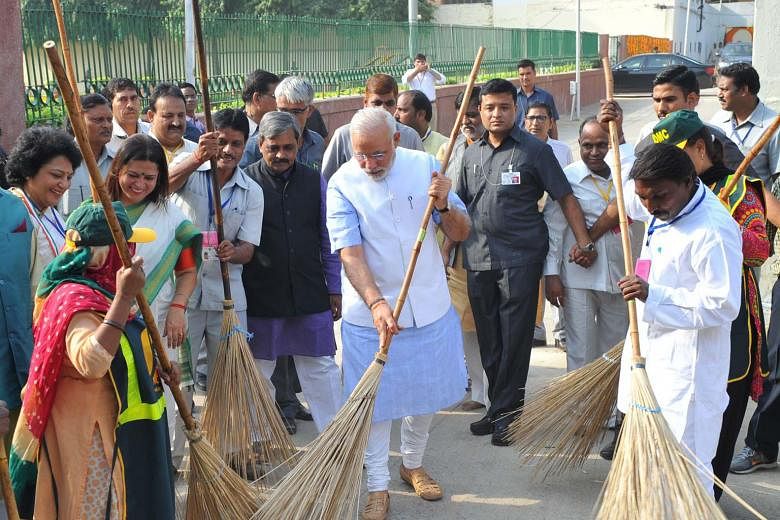On India's Independence Day, Prime Minister Narendra Modi will stand on the ramparts of the historic Red Fort - a red sandstone structure that served as the residence of Mughal emperors - to address the nation and outline the agenda for the coming year.
Yet, going into the annual Aug 15 address, Mr Modi, a leader with a reputation for getting things done, has been struggling to implement his promises and match rhetoric with action, analysts say.
He has had to backtrack on legislation to simplify land acquisition, is battling to initiate labour reforms, has yet to get parliamentary approval for a Goods and Services Tax, and signature campaigns, such as the Clean India campaign and Ganga cleaning mission, have not gained any momentum.
"Modi seems to have lost the aura. The man of action has proved to be a man of words," said Mr D.H. Pai Panandiker, president of private think-tank RPG Foundation.
"Just launching a Make in India campaign (to push manufacturing) doesn't mean people will rush to India to manufacture. They have to match it by action."
-
STUCK IN LIMBO
-
LAND ACQUISITION
Prime Minister Narendra Modi wants to simplify land acquisition rules by amending the 2013 land acquisition law. The government has put it on the backburner till after elections in Bihar, likely in October and November.
GOODS AND SERVICES TAX
The plan to create a unified tax market aims to replace a labyrinth of taxes at the state and federal level. Mr Modi now has just today to pass the Bill in the upper house where the BJP does not have a majority.
CLEAN INDIA CAMPAIGN
Mr Modi launched a five-year Swachh Bharat or "Clean India" campaign in October last year. The programme includes plans to build 110 million toilets and clean cities of garbage.
Mr Modi came to power on the back of a massive landslide in general elections last May on the promise of kickstarting a slowing economy, pushing manufacturing and creating jobs. Expectations were high that the first majority government in years would provide decisive governance and would be willing to take unpopular decisions such as axing petroleum subsidies.
Still Mr Modi, considered the most powerful prime minister in recent years, has taken a cautious approach. He has tried to balance the interests of different groups from corporates, trade unions and the farming community to middle-class India, and groups like the Rashtriya Swayamsevak Sangh, whose affiliates have opposed labour reforms.
He has also been careful not to take unpopular steps ahead of state-level elections where he needs wins to shore up his party in the upper house. State assemblies determine the number of seats in the upper house.
"He has made all these promises and hasn't been able to deliver - that is the problem," said Mr Nilanjan Mukhopadhyay, author of a biography on Mr Modi. "He is increasingly being known as a person who is not decisive and somebody who is bowing to the wishes of pressure groups and lobbies. So he is no different from other prime ministers."
Though Mr Modi has promised zero tolerance on corruption, the image of the government was hit after it was revealed that External Affairs Minister Sushma Swaraj and Rajasthan State Chief Minister Vasundhara Raje had close links to businessman Lalit Modi, who was declared a fugitive from Indian law last week and is being investigated for his financial dealings. This was followed by an exam scam in the BJP-ruled state of Madhya Pradesh.
A lack of majority in the upper house of Parliament has meant crucial legislation like the Goods and Services Tax is stuck in the midst of a deteriorating relationship with the opposition parties.
Analysts said the only way out for Mr Modi is to makeunpopular decisions. "There are numerous areas they should look at, like labour reforms, targeting subsidies when the oil prices have come down, fiscal discipline," said Mr Panandiker.

